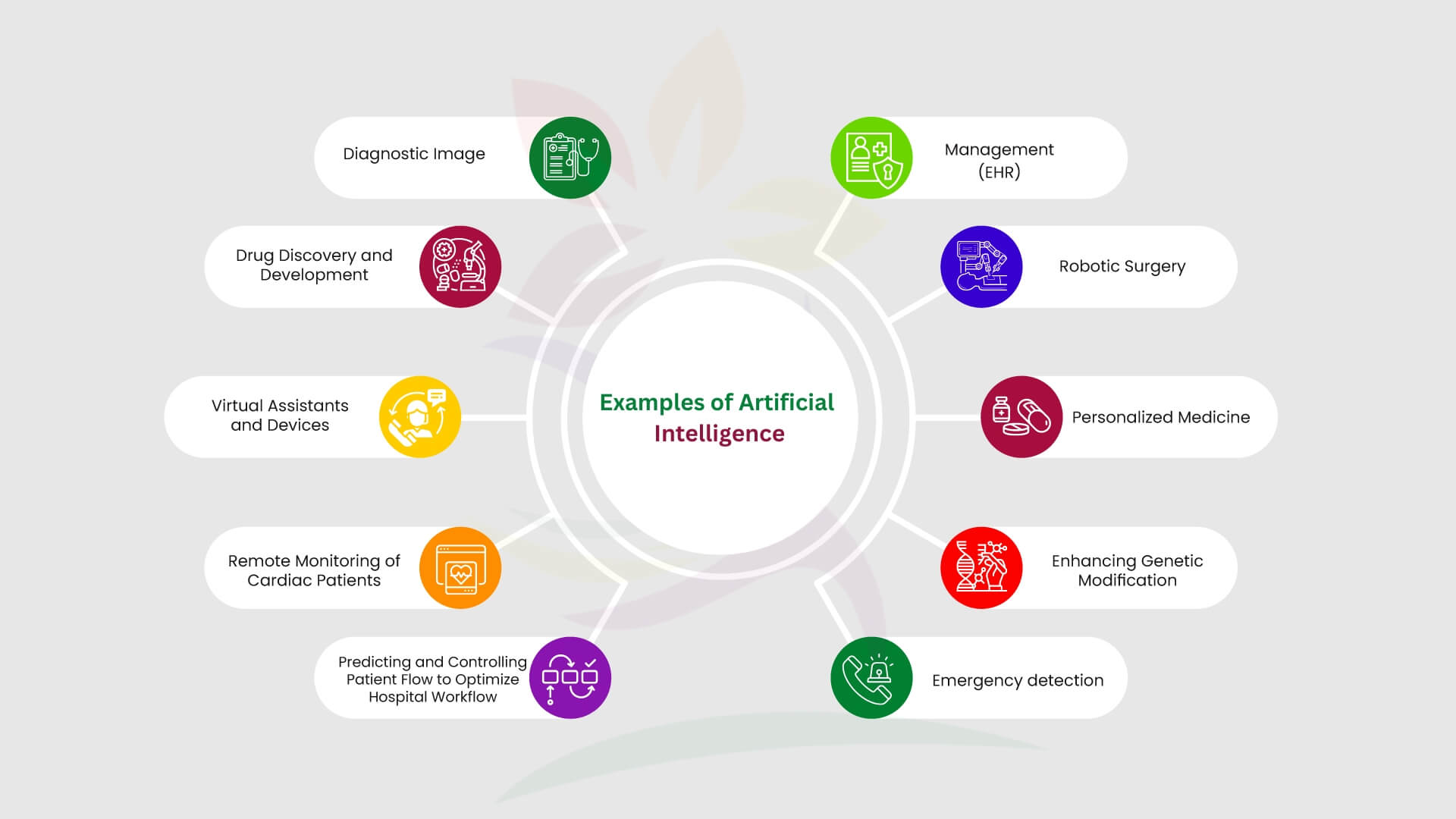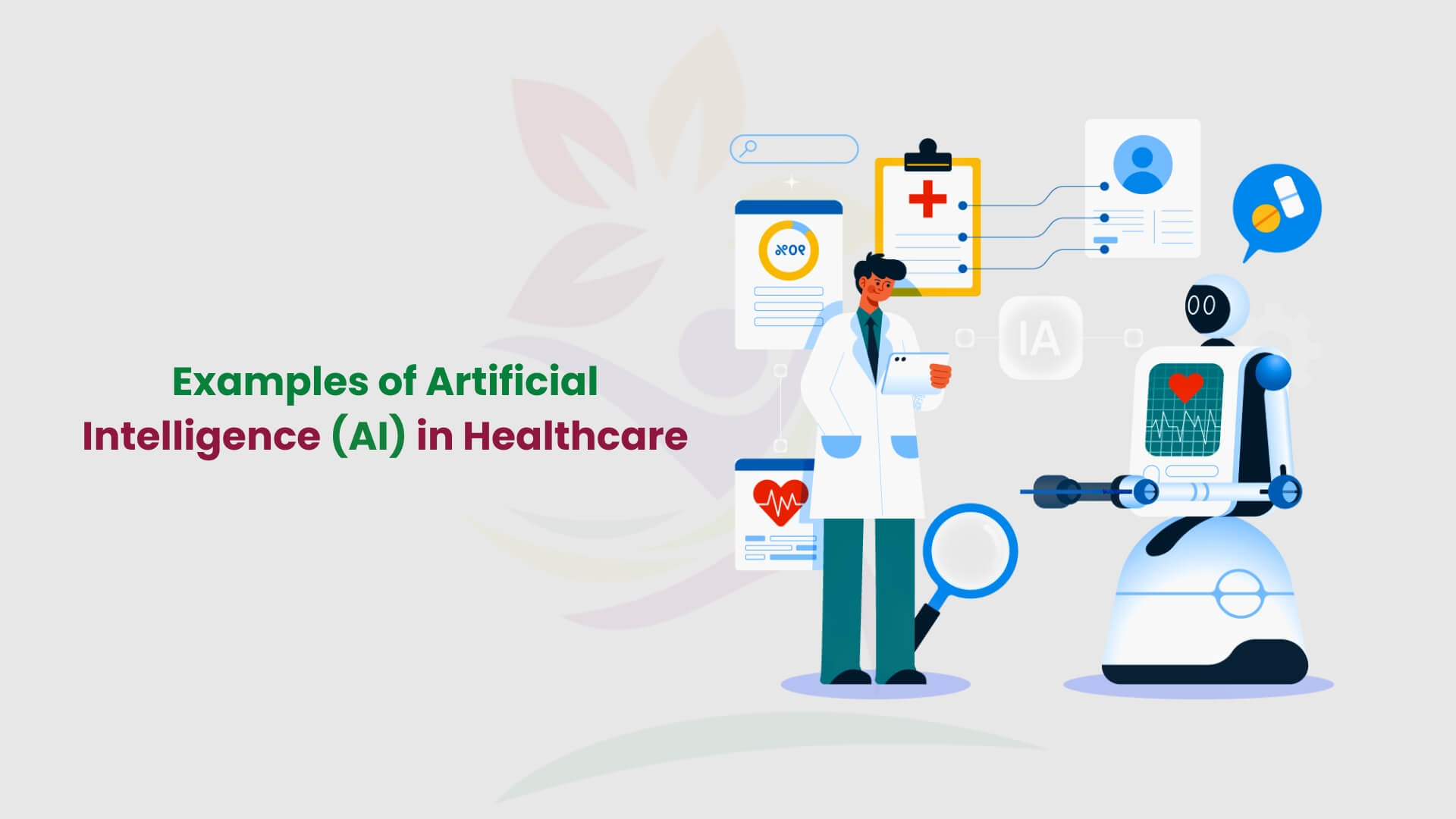Artificial Intelligence is the branch of Computer Science that is used to develop intelligent systems for specific tasks that require human intelligence. AI uses Machine Learning (ML) and Deep Learning for human-provided data, inputs, and intelligence to solve all tasks in a more organized way.
Artificial Intelligence is emerging on the healthcare screen as a revolutionizing technology. It is helping providers to diagnose and treat patients well by making workflow efficient.
Its cutting-edge technology has developed various tools and techniques that are quite helpful in diagnosing a disease and its treatment. According to Statista reports AI market will reach up to 126 billion dollars by 2025. Let’s explore the top 10 examples of ai in healthcare.
Table of Contents
ToggleExamples/Uses of Artificial Intelligence (AI) in Healthcare
AI has vast applications in healthcare systems. Here are the top ten practical examples of AI in the healthcare system.
1-Diagnostic Image
AI has developed such machines that can analyze CT scans, mammograms, X-rays, and other complicated screening tests for early detection of diseases like cancer, stroke, and heart disease more accurately and precisely as compared to a radiologist in Smart clinics.
For example, MR images integrated with AI can detect 44% more accurately patients suffering from sclerosis.
2-Drug Discovery and Development
Preparation of a drug by professionals in labs takes thousands of hours and then it is put to test which roughly costs $1.3 billion. However, only 10% of drugs are marketed successfully.
Integrating AI in labs will reduce time and cost. It is also beneficial in detecting the side effects of any drug and also suggests the best test cases for trials.
3-Virtual Assistants and Devices
AI has also developed different chatbots that are available 24/7 to answer any patient query. These tools help patients get answers to their chronic disease, and set appointments with a doctor.
In this way patient can enjoy his basic medical answer in the comfort of his home. Ada company has developed a virtual health assistant that helps patients to be referred to the relevant clinics by analyzing their symptoms.
4-Remote Monitoring of Cardiac Patients
In recent years heart diseases have increased massively. For this AI has provided chronic solutions by using different technologies. For example, AI has developed devices like smartwatches, smart kiosks and wrist bracelets that detect even a minor change in heart rates. These devices are used to continuously monitor heart rates to provide first aid as sooner.
Atrial Fibrillation has affected millions of people in the past few years as requires 24/7 monitoring of heart rate. For this purpose, Alivecor’s Kardia is developed which is ECG Recorder. It runs invisibly and monitors heart rhythms continuously.
5-Predicting and Controlling Patient Flow to Optimize Hospital Workflow
In large hospitals, there is a massive flow of patients every day. It makes it difficult for staff to handle effectively such patients and manage hospital equipment and beds.
Integrating AI in different hospitals makes it easier to manage all. Getting information of all hospitals can help them to refer patients to the relevant hospitals. For example, AI can help to detect which patient is in severe condition and requires primary care or which patient has recovered now and needs to be steered back.

6-Management of Electronic Health Records
Usually, doctors must collect, manage, and analyze a vast amount of patient data which increases the risk of mistakes. Integrating AI in hospitals can manage all patients and hospital data in a more organized and accurate way. It helps them to store all data effectively.
A doctor only needs to analyze data and suggest suitable treatments to the patients. Besides this AI also follows The Health Insurance Portability and Accountability Act (HIPAA) to secure and protect all data and privacy.
7-Robotic Surgery
AI has developed different robots to assist in various ways for example: surgical robots, medical robots, social robots rehabilitation robots, etc. In healthcare systems surgical robots are used by doctors which help them in different ways even in assisting them in performing complex surgeries.
Here are a few robots with their uses. These robots are developed with different equipment, software, and sensors which help them to communicate with each other to perform surgeon tasks. For example, Vicarious Surgical has tiny arms like humans that enable surgeons to perform mini-invasive procedures more accurately.
8-Personalized Medicine
AI uses the patient’s medical background, genetic information, and lifestyle information to predict health issues and suggest the best medication. It increases more preventive and proactive approaches toward healthcare.
9-Enhancing Genetic Modification
AI is also playing its role in genetic modification by detecting defective genes and replacing them with new healthy genes. It will help to alleviate heredity diseases. For example, CRISPR Cas-9 is a gene editing technology used by scientists to change the DNA of an individual.
10- Emergency detection
AI is optimizing patient pathways and also helping doctors. By using AI HCA has developed Sepsis Prediction and optimization therapy.
It continuously monitors patients’ data in Smart hospitals and detects Sepsis patients six hours earlier than a doctor’s diagnosis. It has reduced the Sepsis mortality rate by up to 30%.
Top Companies Investing in AI Healthcare
Many companies are using AI in healthcare sectors. Few are discussed here.
- IBM Watson Health: IBM Watson is providing AI-based tools for doctors to diagnose, and treat patients well. It also helps in drug discovery, virtual health assistant chatbots, etc.
- Google Health: Google Health is using AI for image analysis and also recommendations for personalized health.
- Microsoft Healthcare: It provides telemedicine sources predictive analysis tools and Electronic Health Records (EHR).
- NVIDIA Healthcare: It is working on AI powdered tools like drug discovery, gene research, imaging, and graphics processing units.
Approximately 37% of companies are integrating their businesses with AI. In 2025 approximately 95% of customer interactions will be done by using AI in their systems.
Future of Artificial Intelligence (AI) in Healthcare
AI has a promising future. It will raise healthcare by innovative technologies. Here are some future predictions of AI in healthcare.
- Robot-Assisted Home Labs Test: In the coming future, there will, be such robotic devices and cloud systems that will help with blood tests for a patient at home. It will reduce and save time and money.
- Multimodal AI Platforms: These platforms can check data formats in video, audio, image, and text modes. They will be helpful for medical devices and chatbots to manage chronic diseases.
- Blood Pressure Revolution: Photoplethysmography technology will be used in smartwatches which will help them to monitor blood pressure and heart rates round the clock in real-time.
Final Thoughts
As we are embracing AI in our healthcare systems it is enhancing our health services from simple diagnosis to perform a complex surgical operation. It is helping both patients and healthcare providers using Hub & Spoke healthcare model. It is playing its role in managing the bulk of data. However, it is necessary to keep in mind data privacy and other considerations. By careful use of AI, proper knowledge, and its collaboration with healthcare we can really transform the healthcare system and can enter in new era of technology.
Frequently Asked Questions
AI in healthcare uses intelligent systems for tasks requiring human intelligence, like diagnosing diseases and managing patient data.
AI improves diagnostic accuracy, enhances patient care, and streamlines hospital operations through innovative technologies.
AI applications include diagnostic imaging, drug discovery, virtual health assistants, remote patient monitoring, and robotic surgery.
Companies like IBM Watson Health, Google Health, Microsoft Healthcare, and NVIDIA Healthcare lead investments in AI healthcare tools and technologies.
The future includes robot-assisted home lab tests, multimodal AI platforms for chronic diseases, and continuous blood pressure monitoring with Photoplethysmography technology, revolutionizing patient care.

